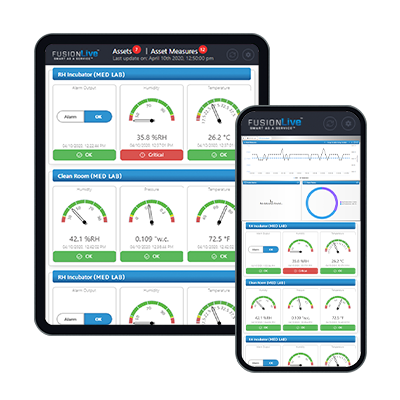
Laboratory Temperature Monitoring Systems
Whether storing medical or biological components, trial samples or chemical compounds, it is vital that they are protected from straying outside of their strictly defined temperature ranges. Doing so would most likely render them useless and potentially impact your research. Consequently, having high quality temperature monitoring data is essential for regulatory compliance, whatever is being stored in the laboratory. Keeping materials at consistent and stable temperatures is crucial to the operation and success, which is why temperature monitoring systems are so important to every type of laboratory.
How E-Control’s Lab Temperature and Humidity Control Systems Work
E-Control Systems provides a comprehensive monitoring solution tailored for laboratory environments. Our system utilizes advanced sensors to continuously monitor critical parameters such as temperature, humidity, air quality, and differential pressure in laboratories. Real-time data is collected and analyzed, providing instant visibility into the conditions of the laboratory spaces.
E-Control Systems provides proactive management through customizable alerts and notifications, promptly alerting designated personnel when parameters deviate from the desired range. This enables immediate action to prevent potential damage or loss of sensitive samples or experiments. The system supports regulatory compliance with detailed documentation, audit logs, and reports. Additionally, our solution includes features like data logging, reporting, and analytics for comprehensive historical records, trend analysis, and identifying areas for improvement. Authorized personnel can also remotely monitor and manage the laboratory environment from anywhere, facilitating swift decision-making and intervention.
E-Control Systems Features for Laboratory Temperature and Humidity Monoitoring
What makes E-Control Systems stand out? Our sensors and intelligates can monitor any aspect of your Laboratory business 24/7.
What Sets Our Lab Temperature Monitoring Systems Apart from Other Options in the Market?
E-Control Systems’ laboratory monitoring solution stands out from other options in the market due to its unique features and capabilities. Our system offers comprehensive monitoring of critical parameters such as temperature, humidity, air quality, and differential pressure in laboratory environments. It provides real-time data collection, analysis, and visualization, allowing for instant visibility into the laboratory conditions and facilitating proactive management.
Our laboratory monitoring solution offers advanced features tailored for laboratory settings. It includes customizable alerts for immediate action, supports regulatory compliance with documentation and audit logs, provides data logging and analytics for trend analysis, and enables remote access for swift decision-making and intervention.
Our Laboratory Customers Include:
Lab Temperature & Humidity Monitoring Systems
However, 44% of labs do not have a temperature monitoring system in place. Traditional methods of temperature recording are manual, time-consuming and usually fail to give the entire picture. In most cases laboratory staff must physically take readings and then enter them into spreadsheets, which means they spend hours carrying out checks and inputing data rather than their actual work.
Technology now provides a better solution to the manual alternative. E-Control Systems’ lab temperature monitoring system will capture the important data in your lab 24/7 through sensors within fridges, freezers and other equipment. The data then uploads to the cloud where anyone that has access can view it wherever they are. If temperature readings move outside predetermined ranges alerts can be sent to staff, at any time day or night, through warnings that you can get through text messages or your computer, smartphone or tablet. Alerts can also be used to let staff know when other items, such as maintenance or safety checks, are needed. E-Control Systems’ temperature monitoring systems is designed specifically to ensure that all of your laboratory procedures are carried out consistently.
Laboratory conditions call for very precise temperatures. For this reason, a finely tuned temperature monitoring system is one of the most important tools for a lab. A failure at a lab can often mean that life-saving vaccines get compromised or years of research get destroyed. Unlike other industries, you can’t often put a price-tag on a failure at a lab.
E-Control Systems can help automate all of your laboratory temperature requirements, including, 4 °C Refrigerators, -20 °C Freezers, -80 °C Ultra Low Temperature Freezers, -200 °C Liquid Nitrogen Freezers, Incubators, as well as humidity and room pressure differential. Also, E-Control Systems enables you to collect FDA required data by simplifying 21 CFR Part 11 compliance.
Don’t let time and money go to waste, make sure you have a wireless temperature monitoring system that you can rely on.
Switching from manual recording to E-Control Systems’ temperature monitoring system will deliver five main benefits in your laboratory:
1. Continuous Data Recording
Our system is programmed to send out warnings and alerts when temperatures move outside of the zones you define. Lab staff can be contacted at any time day or night, and a response quickly organized. These alerts are particularly crucial for labs that are not staffed 24/7. Employees that are on-call can take swift action if any equipment stops working as it should. Continuous monitoring and data recording also give the advantage of anticipating any future problems, such as a slow rise in temperatures over a period of time, so action can be taken before any issues escalate further.
2. Increased Productivity
Highly trained and skilled lab staff still spend a great deal of time manually monitoring equipment every day. By automating the process their time spent doing this can be otherwise focused on the more important work they were trained to do. This improves efficiency and boosts productivity while not only still safeguarding samples, but doing so without human error.
3. Anticipate Malfunctions and Failures
Besides logging data, temperature monitoring systems can also warn you of an issue with your lab equipment before it happens. Alerts can be set to warn you if there is a power outage, your lab equipment needs maintenance, or when items like temperature slowly change, meaning that there is probably an issue with that piece of equipment.
4. Aiding Compliance
Laboratories are required to provide full electronic traceability across the cold chain. Additionally, medical laboratories need to comply with their own standards. Collecting the data for compliance manually is yet another time-consuming step, and there is always the possibility of human error as the data is entered into spreadsheets. Temperature monitoring systems automate the data collection process, while also ensuring it is available and in the right format. Furthermore, you have access to it 24/7 and while you’re away from you lab, which makes preparing for assessments much simpler, faster and more convenient.
5. View Your Data from Anywhere
Not only does our temperature monitoring system have access to the cloud to store your data, but it also has its own mobile app. Your data can be accessed by you, or anyone you give access, from any computer, smart phone or tablet. It can also be accessed from inside your lab, on a conference trip, or during a vacation anywhere in the world!
Laboratory Temperature and Humidity Control Standards
Airborne Infection Control
Working with different strains of bacteria in a lab can be risky and even dangerous if proper humidity control isn't met. Humidifiers regulate humidity. This ensures aerosols and other hazardous airborne materials cannot spread as easily. Proper humidity control is essential to the wellbeing of laboratory workers as well.
Equipment Protection
Laboratories usually demand a humidity to run properly. Proper humidity protects sensitive equipment from electrostatic discharges, and also reduces the risk of damage from excessive moisture buildup on the equipment. Humidity levels should usually be between 40 and 60 percent in labs to protect sensitive laboratory equipment.
Data Accuracy
Lab data is directly tied to the source bacteria and materials that are examined. If humidity in the environment is too low or high it can produce inaccurate results. Humidity conditions in your lab should be consistently maintained to ensure accurate data.
In addition to temperatures, high humidity levels can also have negative effects on medications and pharmaceuticals. Our E-Control System wireless humidity monitoring system uses sensors to continuously monitor the humidity in pharmacies. It enables companies to efficiently manage and control humidity levels while maintaining pharmaceutical product quality and adhering to regulatory standards.
Energy Efficiency
Equipment in labs is abundant, and so is the power needed to run most labs. With regulated and consistent humidity control a laboratory's energy consumption can be greatly reduced, saving labs valuable resources for other needs.
Laboratory Temperature Monitoring FAQ's
How does temperature affect laboratory equipment?
When handling sensitive materials like those involved in clinical trials or biological samples, maintaining a consistent temperature is vital. Exposing these materials to temperatures outside of their required range can compromise the accuracy of scientific research. Labs need to ensure they have reliable temperature monitoring systems in stable storage environments that meet regulatory standards and ensure the integrity of the research.
Why is it important to monitor equipment temperature in a lab?
Reliable temperature control helps labs maintain the precision and consistency research studies require. When a lab temperature and humidity monitor fails, research gets compromised and may be unusable. An advanced temperature monitoring system in a laboratory prevents equipment from overheating or cooling off too much, and degrading materials. Using a trustworthy monitoring system ensures that researchers' data and results are safe, accurate, and can show repeatable, dependable outcomes.
What are the ways that lab temperature sensors can be tested?
Lab temperature sensors can be tested by placing them in a controlled chamber to simulate different temperature and humidity conditions, comparing their readings to a calibrated reference. They can also be monitored in real-time within the lab, and the collected data can be uploaded and stored in the cloud and later analyzed. Sensor performance can be compared to a certified probe across several lab zones to find inconsistencies caused by equipment or airflow. These methods of testing confirm a sensor’s accuracy and the humidity control system compatibility for a lab using cloud-based monitoring.
Why is laboratory temperature a crucial factor in calibration?
Temperature is important for calibration because instruments can give inaccurate readings when thermal conditions vary. They can drift and produce inconsistent readings and faulty research data, which can cause expensive errors in research labs or manufacturing facilities. The precision and validity of laboratory measurements and temperatures are essential in these types of environments because even minor temperature fluctuations can affect the density, conductivity, or viscosity of the materials being measured, leading to unreliable data and skewed calibration results.
What compliance standards require laboratory temperature monitoring?
The Food & Drug Administration (FDA) requires laboratories to maintain laboratory temperature and humidity standards and comply with good laboratory practices to ensure the safety and quality of pharmaceuticals and biological samples. Electronic temperature records have to be accurate and traceable to pass audits. This protects the integrity of products during testing and storage.
What features should you look for in a laboratory temperature monitoring system?
Our E-Control Systems laboratory temperature and humidity monitoring system has precision sensors that monitor temperature, humidity, air quality, and pressure continuously. Features such as our FusionLive dashboard,24/7 monitoring, real-time data logging, and daily summaries are convenient since records of conditions in the environment over time are required by the FDA. The data can be used to accurately analyze trends and optimize performance. A laboratory temperature alarm system sends alerts through a smartphone to notify authorized personnel of deviations in temperature. With convenient remote access, users can oversee the laboratory settings and immediately identify when changes need to be made.







